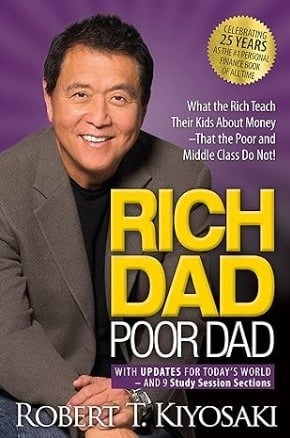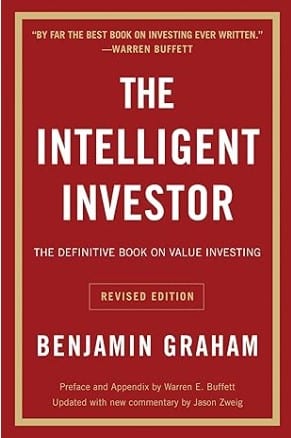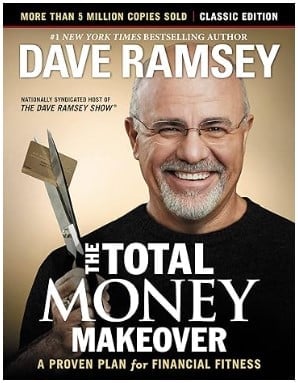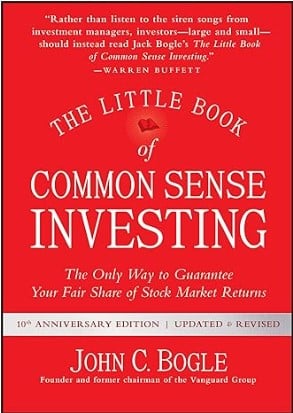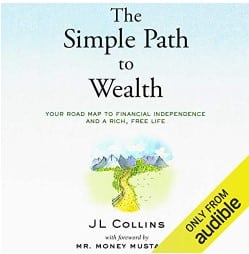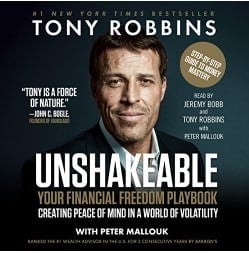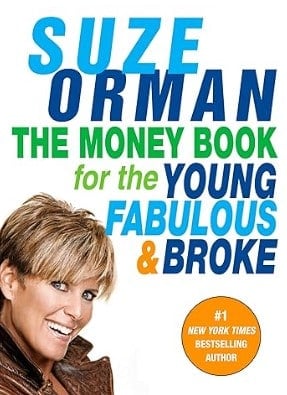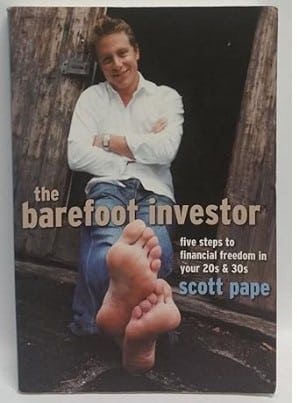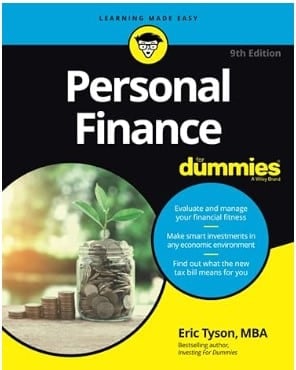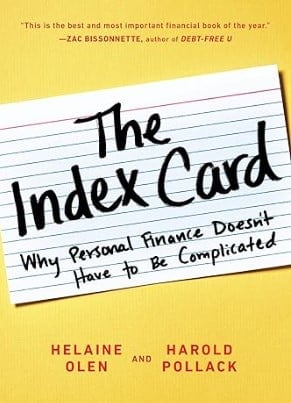I love helping people learn about personal finance. My mum was a banker, so fortunately, I learned the language of money really young—unfortunately, if this wasn't your upbringing, you're never really taught about personal finance.
I've taken to teaching people about financial concepts, whether by editing this publication or writing about it on my own... but I recognize that some authors are much better teachers than I am.
These are some of the best finance books you can find out there. Tuck in, and let's get started.
17 Best Finance Books For Beginners Shortlist
A brave claim, but I think these 17 books are the best personal finance books for beginners, full stop.
- Rich Dad Poor Dad by Robert Kiyosaki
- The Intelligent Investor by Benjamin Graham and Jason Zweig
- The Total Money Makeover by Dave Ramsey
- Your Money or Your Life by Vicki Robin & Joe Dominguez
- The Millionaire Next Door by Thomas J. Stanley
- The Little Book of Common Sense Investing by John C. Bogle
- A Random Walk Down Wall Street by Burton Malkiel
- Broke Millennial by Erin Lowry
- I Will Teach You to Be Rich by Ramit Sethi
- The Simple Path to Wealth by JL Collins
- The Richest Man in Babylon by George S. Clason
- Unshakeable by Tony Robbins
- The Money Book for the Young, Fabulous & Broke by Suze Orman
- The Barefoot Investor by Scott Pape
- Nudge by Richard H. Thaler & Cass R. Sunstein
- Personal Finance for Dummies by Eric Tyson
- The Index Card by Helaine Olen & Harold Pollack
Overviews Of The 17 Best Finance Books For Beginners
Here’s a quick summary of each book, what you’ll learn, and why you should read it, plus a quote from the book where applicable.
1. Rich Dad Poor Dad: What the Rich Teach Their Kids About Money That the Poor and Middle Class Do Not! by Robert Kiyosaki
Summary:
A classic.
"Rich Dad Poor Dad" is a book that contrasts the mindset and financial knowledge of Kiyosaki's “Rich Dad” and “Poor Dad.” It illustrates the fundamental financial principles and illustrates the importance of investing in assets and starting entrepreneurial ventures to achieve financial independence.
What You'll Learn:
You will gain insights into the importance of financial education and wealth-building strategies. The book provides fundamental concepts on the difference between assets and liabilities, emphasizing the significance of making money work for you to avoid the rat race of life.
Why You Should Read It:
This book is essential for beginners as it lays down the foundational principles of financial intelligence. It is an enlightening read that offers a new perspective on money, work, and life and is crucial for anyone looking to break free from the cycle of earning and spending.
Quote From The Book:
“The poor and the middle class work for money. The rich have money to work for them.”
About The Author:
Robert Kiyosaki is a renowned entrepreneur, investor, and educator, championing the cause of financial literacy. Connect with him on LinkedIn, and Twitter, or explore more about his works and philosophies on his company website.
2. The Intelligent Investor Rev. Ed: The Definitive Book on Value Investing by Benjamin Graham and Jason Zweig
Summary:
"The Intelligent Investor" is a comprehensive guidebook on value investing. Benjamin Graham’s philosophy of “value investing” shields investors from substantial error and teaches them to develop long-term strategies, making this book an invaluable tool in the world of investing.
What You'll Learn:
You will learn the principles of value investing, risk management, and the development of long-term strategies. Graham's philosophy will guide you on avoiding substantial error and teach the art of "value investing" to achieve consistent, long-term success.
Why You Should Read It:
This book is a beacon for individuals desiring to refine their investing skills and decisions. It delves into the psychology of investing, which is crucial for avoiding the pitfalls that emotions can lead to, making it an indispensable read for anyone serious about attaining success in investing.
Quote From The Book:
“In the short run, the market is a voting machine, but in the long run, it is a weighing machine.”
About The Author:
Benjamin Graham was a notable economist and professional investor.
3. The Total Money Makeover: Classic Edition: A Proven Plan for Financial Fitness by Dave Ramsey
Summary:
The Total Money Makeover" provides a bold and straightforward approach to money management. Dave Ramsey provides a comprehensive plan to get out of debt, save money, and invest wisely, aimed at those who seek financial fitness and stability.
What You'll Learn:
You’ll learn the steps to eliminate debt, build an emergency fund, and invest wisely. Ramsey provides actionable advice on budgeting, saving, and avoiding debt, enabling readers to achieve financial stability and wealth.
Why You Should Read It:
Dave Ramsey’s proven money-making strategies and debt-reduction methods have transformed the financial lives of millions. This book is for anyone desiring to attain financial fitness and avert the common pitfalls related to debt and spending.
Quote From The Book:
“We buy things we don't need with money we don't have to impress people we don't like.”
About The Author:
Dave Ramsey is a financial guru and best-selling author focusing on personal finance. Explore more about his financial wisdom on LinkedIn, and Twitter, or visit his website for more resources and insights.
4. Your Money or Your Life: Transforming Your Relationship with Money and Achieving Financial MORE by Vicki Robin & Joe Dominguez
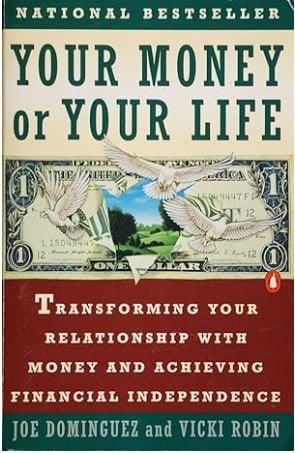
Summary:
"Your Money or Your Life" is a groundbreaking book that redefines the relationship one has with money, emphasizing living a more deliberate and fulfilled life. It presents a systematic program for transforming your relationship with money and achieving financial independence.
What You'll Learn:
You’ll absorb strategies for debt-free living, saving money, and making conscious spending decisions. This book helps readers understand the value of money in correlation to time and life energy, redefining how to approach earning and spending.
Why You Should Read It:
This book is a treasure for those yearning to attain a life of financial independence and value-based living. It’s an essential read for anyone looking to transform their relationship with money and seeking a life of more freedom and fulfillment.
Quote From The Book:
“Money is something we choose to trade our life energy for.”
About The Author:
Vicki Robin is a renowned author and speaker, advocating for financial independence and a sustainable lifestyle. Explore more about Vicki on LinkedIn, Twitter, or her personal website.
5. The Millionaire Next Door by Thomas J. Stanley
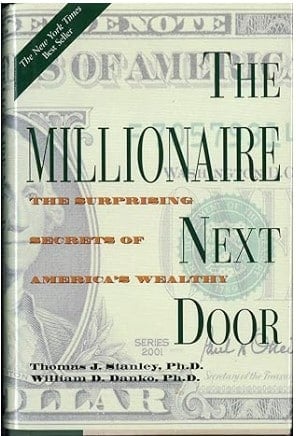
Summary:
"The Millionaire Next Door" uncovers the common traits of those who accumulate wealth, debunking myths about the wealthy. It presents extensive research on millionaires and their lifestyles, breaking stereotypes and highlighting the path to building wealth.
What You'll Learn:
Readers will learn about the seven common traits found among those who accumulate wealth, including living below one's means and allocating time, energy, and money efficiently.
Why You Should Read It:
This book is insightful for individuals aspiring to accumulate wealth by living purposefully. It reveals the real picture of wealth in America, offering a roadmap to becoming the ‘millionaire next door’ through disciplined and resilient wealth-building strategies.
Quote From The Book:
“Wealth is not the same as income. If you make a good income each year and spend it all, you are not getting wealthier. You are just living high.”
About The Author:
Thomas J. Stanley was a bestselling author and a researcher on the affluent in America. For more insights and research, visit his website.
6. The Little Book of Common Sense Investing: The Only Way to Guarantee Your Fair Share of Stock Market Returns by John C. Bogle
Summary:
John C. Bogle's book is a guiding light in the world of investing, providing the blueprint for owning a portion of a stock market portfolio. It emphasizes the benefits of low-cost index funds, highlighting the importance of simplicity in investment strategy.
What You'll Learn:
You will understand the essence of simplicity in investing, the importance of focusing on the long term, and the value of relying on well-established, low-cost index funds to achieve reliable returns.
Why You Should Read It:
For anyone willing to navigate the investment maze, this book serves as a beacon, unraveling the importance of simplicity and long-term focus. It's a crucial read to make the most of your investments and avoid the pitfalls of complex, costly investing strategies.
Quote From The Book:
“A low-cost index fund is the most sensible equity investment for the great majority of investors.”
About The Author:
John C. Bogle was the founder of the Vanguard Group and a major proponent of index investing.
7. A Random Walk Down Wall Street: The Time-Tested Strategy for Successful Investing by Burton Malkiel
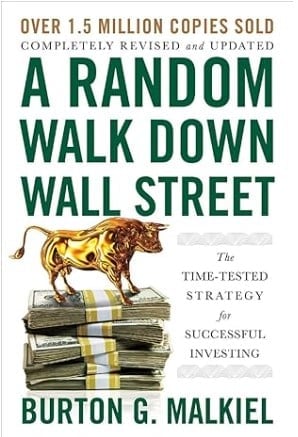
Summary:
Burton Malkiel’s esteemed work offers a comprehensive guide to various investment opportunities, focusing on the ‘random walk’ hypothesis. It elucidates a myriad of investment strategies, advocating for the long-term buy-and-hold strategy.
What You'll Learn:
You'll gain insights into the functioning of the stock market, the effectiveness of technical and fundamental analysis, and the foundational principles of a successful investment portfolio.
Why You Should Read It:
This book provides an extensive understanding of the complexities of the stock market, making it an invaluable resource for anyone aiming to navigate the ever-evolving investment landscape successfully. Its empirical wisdom is crucial for making informed and prudent investment decisions.
Quote From The Book:
“The problem with gold is that it does not earn any return and its price is determined solely by demand relative to supply.”
About The Author:
Burton Malkiel is an economist and writer, specializing in the stock market and investment strategies.
8. Broke Millennial: Stop Scraping By and Get Your Financial Life Together by Erin Lowry
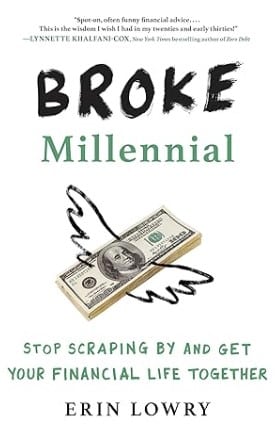
Summary:
Erin Lowry's book is a practical and accessible guide, tailored to address the financial concerns and aspirations of millennials. It brings forth a plethora of real-life scenarios, advice, and actionable tips to manage money effectively.
What You'll Learn:
You will learn the nitty-gritty of budgeting, investing, handling debt, and understanding your money mindset.
Why You Should Read It:
Erin Lowry’s practical advice and relatable narrative make this book a must-read for millennials struggling with financial dilemmas. It’s a step toward financial literacy and empowerment, helping the reader navigate their financial journey with confidence.
Quote From The Book:
“It’s not about hitting a $1 million mark; it’s about managing the money you have in a way that helps you live your best life.”
About The Author:
Erin Lowry is a millennial personal finance expert, speaker, and author. You can follow her insights and connect with her on LinkedIn.
9. I Will Teach You to Be Rich by Ramit Sethi
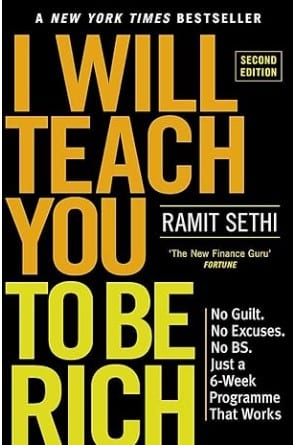
Summary:
Ramit Sethi’s book is a bold, conversational guide to wealth creation, emphasizing no-guilt money philosophies. It offers a robust six-week personal finance program focused on banking, saving, budgeting, and investing.
What You'll Learn:
Readers will learn the intricacies of banking, saving, budgeting, and investing, along with mastering the psychology of money to live a rich life.
Why You Should Read It:
With a relatable and unapologetic approach, this book is for anyone aiming to master their money without sacrificing entertainment and leisure. It offers a blend of wealth-building strategies and insights into leveraging money as a tool to achieve life’s riches.
Quote From The Book:
“There is a limit to how much you can cut but there is no limit to how much you can earn.”
About The Author:
Ramit Sethi is a personal finance advisor, author, and entrepreneur. Connect with him on LinkedIn, or explore his philosophies on his company website.
10. The Simple Path to Wealth: Your Road Map to Financial Independence and a Rich, Free Life by JL Collins
Summary:
JL Collins presents a succinct guide to financial independence and wealth-building, emphasizing the power of simplicity and consistent investments in low-cost index funds.
What You'll Learn:
You'll uncover the principles of financial independence, the significance of savings, and the essence of sound investment in achieving a wealthy, free life.
Why You Should Read It:
This book is vital for those seeking a straightforward path to wealth, providing clear strategies and insights on managing money and investments to attain financial freedom. It's a guide to understanding money in its simplest form and using it as a tool to shape your future.
Quote From The Book:
“Prosperity is only an instrument to be used, not a deity to be worshipped.”
About The Author:
JL Collins is a renowned financial blogger and author.
11. The Richest Man in Babylon: The Original 1926 Edition by George S. Clason
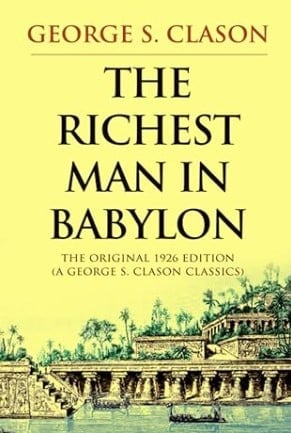
Summary:
George S. Clason’s timeless classic uses ancient Babylonian parables to impart fundamental financial lessons. It provides foundational wisdom on wealth accumulation, preservation, and sharing.
What You'll Learn:
You’ll grasp essential financial principles such as living below your means, seeking wise counsel, and investing wisely for income through the enchanting parables from the wealthiest city of the ancient world, Babylon.
Why You Should Read It:
The allegorical tales in this book render timeless financial wisdom and are a beacon for anyone looking to establish a solid financial foundation. Its enduring lessons on wealth creation are as relevant today as they were in 1926.
Quote From The Book:
“Start thy purse to fattening.”
About The Author:
George S. Clason was a soldier, businessman, and writer, best known for his instructive works on financial success. More about his life and works can be discovered through historical records and his lasting contributions to financial literature.
12. Unshakeable by Tony Robbins
Summary:
Tony Robbins’ “Unshakeable” serves as a financial freedom playbook, illustrating the strategies of the world's top investor, Warren Buffet. Robbins deciphers the codes to financial success, wealth management, and long-term financial freedom in this insightful read.
What You'll Learn:
You’ll delve into the financial strategies and investment secrets from some of the world’s most successful investors and learn the keys to building long-term wealth even in the most uncertain economic times.
Why You Should Read It:
Robbins’ expertise, coupled with insights from financial giants, makes this book an essential read for those aiming to attain financial resilience and independence. It offers a holistic view of wealth creation, focusing on both financial strategies and the psychological aspects of money.
Quote From The Book:
“The stock market is a device for transferring money from the impatient to the patient.”
About The Author:
Tony Robbins is a world-renowned life and business strategist, author, and entrepreneur. Connect with him through LinkedIn, or Twitter, or visit his company website for more resources and insights.
13. The Money Book for the Young, Fabulous & Broke by Suze Orman
Summary:
Suze Orman’s book is a finance guide for the younger generation, addressing specific financial challenges faced by young adults and providing practical advice on credit, investing, and retirement.
What You'll Learn:
Gain insights into managing debt, building credit, saving, investing, and achieving financial stability even with limited resources. Understand how to make informed financial decisions that lead to a secure future, including mastering essential accounting concepts for better money management.
Why You Should Read It:
This book is a must-read for young adults struggling to navigate the complex world of finance. It offers practical, step-by-step guidance to overcome financial hurdles and build a robust financial future, making it especially pertinent to those who are young, fabulous, and broke.
Quote From The Book:
“True financial freedom is not only having money but having power over that money as well.”
About The Author:
Suze Orman is a renowned financial advisor, author, and speaker. To learn more about her philosophies and get more financial advice, visit her website or connect with her on LinkedIn.
14. The Barefoot Investor by Scott Pape
Summary:
Scott Pape’s “The Barefoot Investor” provides Australians with a step-by-step guide to financial freedom, offering simple strategies for managing money, investing wisely, and securing a stress-free retirement.
What You'll Learn:
Discover the principles of sound money management, debt reduction, and retirement planning with easy-to-follow steps and financial advice applicable to real-life situations.
Why You Should Read It:
This book’s no-nonsense approach to financial planning and its specific focus on Australian financial landscapes make it a valuable read for anyone, regardless of their financial knowledge or background, looking to gain control over their finances and live freely.
Quote From The Book:
“Don’t follow the herd. It doesn’t end well.”
About The Author:
Scott Pape is a distinguished financial counselor and author specializing in personal finance. You can connect with him through his website for more financial strategies and advice.
15. Nudge: Improving Decisions About Health, Wealth, and Happiness by Richard H. Thaler & Cass R. Sunstein
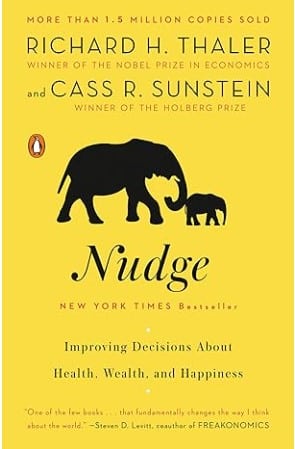
Summary:
“Nudge” explores how the design of choices impacts our decisions and how slight changes can significantly improve our ability to make better choices in health, wealth, and happiness.
What You'll Learn:
Understand the concept of "choice architecture" and how it influences decision-making processes. Learn how to set up environments that nudge people towards decisions that are beneficial in the long run.
Why You Should Read It:
This book is essential for anyone interested in understanding human behavior and decision-making. It provides insights into how subtle changes can lead to significant improvements in making choices, whether it’s about personal finance, health, or overall well-being.
Quote From The Book:
“A nudge… is any aspect of the choice architecture that alters people’s behavior predictably without forbidding any options or significantly changing their economic incentives.”
About The Authors:
Richard H. Thaler is a Nobel Laureate, and Cass R. Sunstein is a legal scholar. Explore more of their work on behavioral economics and law through their respective academic profiles and publications.
16. Personal Finance for Dummies by Eric Tyson
Summary:
Eric Tyson’s book is a comprehensive guide to building wealth and securing financial stability. It covers a range of topics including budgeting, reducing debt, investing, insurance, taxes, and retirement planning.
What You'll Learn:
This book offers extensive knowledge on managing money, building wealth, and planning for the future. It provides practical tips and advice to handle personal finance efficiently and make informed financial decisions.
Why You Should Read It:
“Personal Finance for Dummies” is suitable for those seeking to understand the basics of financial management and gain control over their financial life. Its detailed approach makes it an invaluable resource for anyone looking to enhance their financial literacy.
Quote From The Book:
“Taking control of your finances is a life-long skill—well worth the investment of your time and energy.”
About The Author:
Eric Tyson is an accomplished finance author and speaker. For more insights on personal finance and to connect with him, you can visit his company website.
17. The Index Card: Why Personal Finance Doesn’t Have to Be Complicated by Helaine Olen & Harold Pollack
Summary:
Olen and Pollack demystify personal finance, asserting that all the financial information one needs can fit on a single index card. The book offers straightforward advice on spending less, saving more, investing wisely, and navigating the maze of financial products and services.
What You'll Learn:
Learn the fundamental principles of personal finance, including saving, spending, investing, and securing a robust financial future, all distilled into simple, actionable steps.
Why You Should Read It:
The simplistic yet profound approach of “The Index Card” makes it a must-read for anyone overwhelmed by the complexity of personal finance. It provides clarity and actionable advice to improve financial health without unnecessary complications.
Quote From The Book:
“The best financial advice is simple, easy to understand, and inexpensive.”
About The Author:
Helaine Olen is a commentator on personal finance, and Harold Pollack is a public health researcher. For more insights and advice visit Helaine’s LinkedIn.
Which Best Finance Books For Beginners Do You Recommend?
I invite you to share any pivotal finance books you believe should be included in this list. Your insights are valued, and your recommendations are welcomed, as they can help enhance this collection and assist others on their journey to financial literacy and independence.


